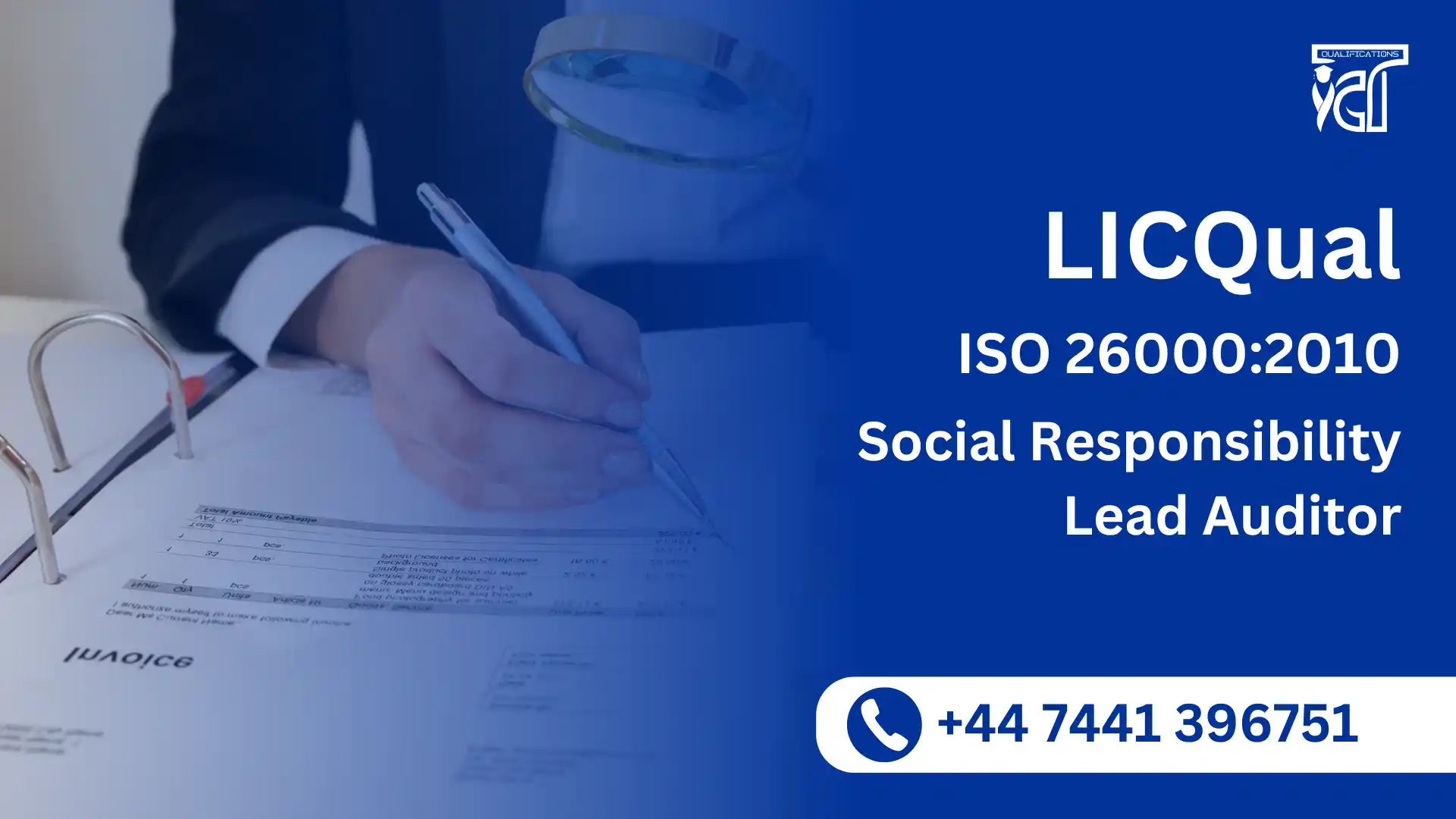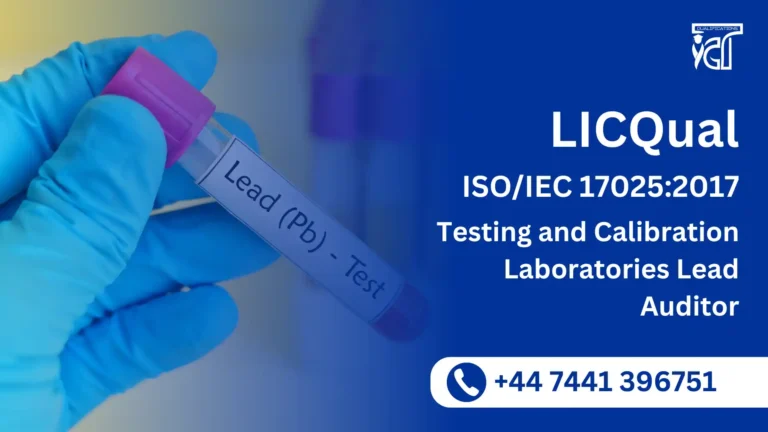The LICQual ISO 26000:2010 Social Responsibility Lead Auditor course is designed to provide professionals with comprehensive knowledge and skills required to lead audits and assessments of social responsibility practices within organizations based on the ISO 26000:2010 standard. This globally recognized guideline offers organizations practical guidance on operating in a socially responsible manner that contributes to sustainable development.
The LICQual ISO 26000:2010 Social Responsibility Lead Auditor empowers learners to understand the principles of social responsibility, stakeholder engagement, ethical behavior, and sustainable practices across various sectors. Participants will gain a thorough understanding of ISO 26000’s core subjects, including organizational governance, human rights, labor practices, the environment, fair operating practices, consumer issues, and community involvement and development.
Upon completion the LICQual ISO 26000:2010 Social Responsibility Lead Auditor, learners will be equipped to conduct internal and external audits effectively, ensuring that organizations not only comply with international social responsibility standards but also promote trust, transparency, and accountability among their stakeholders. This training is ideal for auditors, consultants, compliance managers, and professionals dedicated to integrating social responsibility into organizational strategy and operations.
LICQual ISO 26000:2010 Social Responsibility Lead Auditor
Following are the mandatory units of LICQual ISO 20121:2024 Event Sustainability Management Systems:
| Unit Ref# | Unit Title | Credit | GLH |
| LICQ2200104-1 | Introduction to ISO 26000:2010 and Social Responsibility Principles | 8 | 24 |
| LICQ2200104-2 | Understanding Organizational Governance and Social Responsibility | 8 | 24 |
| LICQ2200104-3 | Human Rights and Labor Practices in Social Responsibility | 6 | 18 |
| LICQ2200104-4 | Environmental Responsibility and Sustainable Practices | 6 | 18 |
| LICQ2200104-5 | Fair Operating Practices and Ethical Business Practices | 6 | 18 |
| LICQ2200104-6 | Community Involvement and Consumer Issues in Social Responsibility | 6 | 18 |
GLH (Guided Learning Hours) and TQT (Total Qualification Time) are terms commonly used in vocational qualifications to help define the amount of time a learner is expected to spend on their studies.
1. GLH (Guided Learning Hours)
GLH refers to the number of hours a learner spends being directly taught, supervised, or supported during their course. This includes the time spent in activities such as:
- Classroom instruction
- Practical workshops
- One-on-one tutoring or mentoring sessions
- Online learning sessions with tutor support
In other words, GLH represents the time that learners are actively engaged with their instructors or learning activities.
2. TQT (Total Qualification Time)
TQT represents the total amount of time a learner is expected to invest in completing a qualification, including:
- GLH (Guided Learning Hours): Time spent on direct learning, as explained above.
- Self-Directed Learning: This includes time spent on independent study, research, assignment completion, preparation for exams, and any other work the learner does outside of direct teaching hours.
TQT is a broader measure that includes all the time required to achieve the qualification. It helps learners and employers understand the overall commitment required for the qualification.
Key Differences Between GLH and TQT:
- GLH focuses on direct learning with guidance or supervision.
- TQT includes GLH as well as independent study time and other learning-related activities.
Example:
If a qualification has a TQT of 600 hours and a GLH of 250 hours, it means the learner should spend 250 hours in direct learning (classroom, online, or tutor-led sessions) and 350 hours on independent study or research.
By the end of this course, learners will be able to:
Introduction to ISO 26000:2010 and Social Responsibility Principles
Upon completion of this unit, learners will be able to:
- Understand the key principles and core components of ISO 26000:2010.
- Recognize the significance of social responsibility in the global business landscape.
- Identify the seven key areas of social responsibility and their importance in creating a socially responsible organization.
- Apply the ISO 26000 framework to evaluate social responsibility initiatives within organizations.
Understanding Organizational Governance and Social Responsibility
By the end of this unit, learners will be able to:
- Define organizational governance and its role in implementing socially responsible practices.
- Assess leadership, transparency, and accountability in organizations according to ISO 26000.
- Evaluate how governance structures influence decision-making, stakeholder engagement, and ethical business conduct.
- Demonstrate the process of auditing organizational governance to ensure alignment with social responsibility standards.
Human Rights and Labor Practices in Social Responsibility
After completing this unit, learners will be able to:
- Identify human rights and labor practices issues that organizations must address to comply with ISO 26000.
- Evaluate an organization’s commitment to human rights and fair labor practices within the workplace and supply chain.
- Develop strategies for auditing human rights policies, ensuring non-discrimination, equal opportunity, and fair wages.
- Assess compliance with international labor standards and human rights guidelines in various organizational settings.
Environmental Responsibility and Sustainable Practices
Upon successful completion of this unit, learners will be able to:
- Understand the key environmental considerations outlined in ISO 26000:2010.
- Assess an organization’s environmental practices, including energy efficiency, waste reduction, and resource conservation.
- Evaluate the impact of an organization’s operations on the environment and recommend sustainable practices for improvement.
- Apply environmental auditing techniques to measure an organization’s commitment to sustainable development.
Fair Operating Practices and Ethical Business Practices
By the end of this unit, learners will be able to:
- Understand the importance of fair operating practices, including anti-corruption and ethical business behavior.
- Analyze and audit business practices related to competitive conduct, stakeholder relations, and supply chain management.
- Identify and mitigate unethical or unfair business practices in line with ISO 26000 principles.
- Develop strategies to foster transparency, integrity, and ethical business conduct within organizations.
Community Involvement and Consumer Issues in Social Responsibility
After completing this unit, learners will be able to:
- Recognize the significance of community involvement and consumer protection in achieving social responsibility.
- Assess an organization’s impact on its local community, stakeholder relations, and social contributions.
- Evaluate an organization’s approach to consumer rights, product safety, and ethical marketing practices.
- Implement strategies for improving an organization’s community engagement and ensuring responsible consumer practices.
Key Benefits of the LICQual ISO 26000:2010 Social Responsibility Lead Auditor
- Comprehensive Understanding of Social Responsibility
- Gain in-depth knowledge of the ISO 26000:2010 standard and its application in promoting ethical, sustainable, and socially responsible practices across organizations.
- Enhanced Auditing Competence
- Develop the skills to plan, conduct, report, and follow up on social responsibility audits in accordance with international best practices.
- Global Recognition and Career Advancement
- Achieve a globally recognized qualification that enhances your professional credibility and opens up career opportunities in compliance, sustainability, corporate governance, and auditing roles worldwide.
- Ability to Drive Sustainable Development
- Empower organizations to align their operations with sustainable development goals (SDGs) and build trust with stakeholders by promoting responsible and ethical practices.
- Improved Stakeholder Engagement
- Learn effective techniques for engaging with stakeholders—including employees, communities, customers, and investors—to strengthen organizational reputation and social performance.
- Value Addition for Organizations
- Support organizations in enhancing their social responsibility performance, reducing risks, and building long-term value by integrating ISO 26000 guidelines into their business strategies.
- Practical and Real-World Insights
- Benefit from case studies, practical examples, and real-world scenarios that prepare you to tackle social responsibility challenges across various industries and sectors.
- Professional Growth for Auditors and Consultants
- Ideal for professionals aspiring to lead third-party audits or consult organizations on social responsibility implementation, offering an essential edge in a competitive global market.
Ideal Learner: LICQual ISO 37001:2016 Anti-Bribery Management Systems Lead Auditor
The LICQual ISO 26000:2010 Social Responsibility Lead Auditor is ideal for:
✔ Aspiring and Experienced Auditors
Individuals seeking to build or enhance their skills in auditing social responsibility systems based on the ISO 26000:2010 standard.
✔ Compliance and CSR Professionals
Compliance officers, corporate social responsibility (CSR) managers, and sustainability officers responsible for implementing and maintaining ethical and socially responsible practices within organizations.
✔ Consultants and Advisors
Management consultants, sustainability advisors, and CSR strategists who guide organizations in adopting and improving socially responsible policies and practices.
✔ Quality, Environmental, and Occupational Health & Safety Managers
Professionals who want to integrate social responsibility principles into their existing management systems to drive organizational improvement.
✔ Business Owners and Senior Managers
Executives and entrepreneurs aiming to align their business strategies with international social responsibility standards to enhance corporate reputation and stakeholder trust.
✔ Professionals Involved in Stakeholder Engagement
Personnel responsible for community relations, public affairs, and stakeholder communication who want to deepen their understanding of social responsibility principles.
✔ Individuals Committed to Sustainable Development
Anyone with a passion for sustainable development, ethical governance, and responsible business practices who wishes to contribute meaningfully to global social responsibility efforts.
Entry Requirements
Register Now
Qualification Process
Qualification Process for the LICQual ISO 26000:2010 Social Responsibility Lead Auditor
- Self-Assessment:
Begin by evaluating your eligibility to ensure you meet the qualification requirements, including work experience, knowledge, and language proficiency. - Registration:
Complete your registration by submitting the required documents, including a scanned copy of a valid ID, and paying the registration fee. - Induction:
An assessor will conduct an induction to confirm your eligibility for the course and explain the evidence requirements. If you do not meet the criteria, your registration will be canceled, and the fee will be refunded. - Assignmnets & Evidence Submission:
Provide all assignmnets and the necessary evidence based on the assessment criteria outlined in the course. If you are unsure of the required evidence, consult with the assessor for guidance on the type and nature of evidence needed. - Feedback and Revision:
The assessor will review your submitted evidence and provide feedback. Evidence that meets the criteria will be marked as “Criteria Met,” while any gaps will be identified. You will be asked to revise and resubmit if needed. - Competence Evidence:
Submit final evidence demonstrating that all learning outcomes have been met. This evidence will be marked as “Criteria Met” by the assessor once it is satisfactory. - Internal Quality Assurance (IQA):
The Internal Quality Assurance Verifier (IQA) will review your evidence to ensure consistency, quality, and compliance with standards. - External Verification:
The IQA will submit your portfolio to LICQual External Quality Assurance Verifiers (EQA) for final confirmation. The EQA may contact you directly to verify the authenticity of your evidence. - Certification:
Upon successful completion of all checks, LICQual will issue your official certificate, confirming that you have attained the LICQual ISO 26000:2010 Social Responsibility Lead Auditor.







